- Home
- Emma Chase
Appealed Page 2
Appealed Read online
Page 2
Have I mentioned that Waldo can also be one shrewd son of a bitch?
2
I’ve seen my last name inscribed on libraries, hospital wings, and the like, but there’s an extra thrill seeing it on the Law Offices of Becker, Mason, Santos & Shaw. Because it’s mine, not my family’s, something I did on my own. When you grow up in the shadow of all the accomplishments of those who came before you, that’s a big deal.
Jessica, our summer minion—also known as an intern—welcomes me with starry eyes and a stack of messages. “Good afternoon, Mr. Mason.”
I take the messages and avoid eye contact, keeping my face neutral. It’s a well-practiced move. Because interns are hungry, enthusiastic, willing to bend over backward.
And that’s particularly true of Jessica.
The way she stares, the way she accidentally brushes her tits against my arm, the way she walks by my office when I’m working late, says she’s willing to let me bend her any which way I want. And Jessica’s not your average-looking minion—tall, redheaded, with hips every man would imagine holding onto doggie style. She’s hot.
She’s also twenty-four.
I don’t know when twenty-four became too young—I just know it is.
“Thank you, Jessica.”
I walk up the stairs to the top floor. Dark-wood floors, original crown moldings, and bold-toned window dressings give the area a professional, historical elegance. Two desks—one occupied by our secretary, Mrs. Higgens, and one for our paralegal—are stationed along opposite walls, with two long, brown leather sofas facing each other on the remaining ones.
I nod to Mrs. Higgens and head into my office to work the rest of the afternoon.
• • •
At four o’clock I stick my head outside my office door to collect my client, Justin Longhorn. He’s a typical millennial slacker—brown messy hair, beat-up skinny jeans, a retro Nirvana T-shirt over a lanky form, his thumb busily sliding over the latest iPhone.
Before I can greet him, sixteen-year-old Riley McQuaid walks down the hallway. She’s been working here a couple of hours a week this summer. Riley is the oldest of the six McQuaid kids.
Jake’s McQuaid kids.
If you don’t understand the significance of that, you will in a second. Because what happens next feels just like watching a car crash in slow motion.
Or the mating dance of pubescent ostriches. There’s some really weird stuff on YouTube.
Their eyes drag over each other, head to matching-Converse-sneaker-covered toes.
Justin lifts his chin. “Hey.”
Riley pushes her curly brown hair behind her ear. “Hey.”
No good can come of this. And I’m not the only one who thinks so.
“Heeey,” Jake says—in a low growl from his office doorway—where he looms large with crossed arms and quicksilver gray eyes.
Jake Becker is a hell of a guy, one of my closest friends. He can also be a scary overprotective motherfucker when he wants to be. The scowl he’s sending my client’s way has reduced older, larger men to tears.
But Justin doesn’t see it—because he’s too busy checking Riley out.
“I have some filing for you to do, Riley.” Jake jerks his thumb over his shoulder. “In my office.”
“Okay. Coming.” But she doesn’t—at least not right away. Not until after she bites her lip Justin’s way and utters the classic, “Later.”
Justin nods. “Definitely.”
Huh. Never would’ve pegged Justin as the suicidal type. But I guess you just never know.
After Riley slips past Jake into his office, he continues to hold Justin in the grip of his icy glare. And the kid has shit self-preservation instinct, because he nods his chin with a clueless, “S’up man.”
Jake’s face is as friendly as a rock.
I feel some responsibility for Justin. He’s my client; it’s my job to keep him out of jail and—you know—alive.
“Jake, I got this. I’ll . . . explain things.”
“I’d appreciate that,” he tells me darkly. Then, without another glance at Justin he disappears into his office.
I usher the teenager through my door and shut it behind him.
“Who was—” he starts to ask.
“Don’t,” I warn. Then I point to the chair. “Sit.”
“But—”
“Stop.” My voice rumbles—grabbing his attention. Because I’m a happy guy. Carefree. Easygoing. Until I’m not. When those moments come, it gets a reaction. Justin sits.
I face him from across my desk. “Do you watch Game of Thrones, Justin?”
“Yeah, sure.” He answers, brows drawing together.
“Do you remember the episode where the one guy crushed the other guy’s head with his bare hands?”
“Yeah . . . ?”
I point toward the door. “You keep thinking about that girl the way you were thinking of her a minute ago—that’s what’s in your future.”
He sits back, considering my words—and probably imagining the terrifically brutal scene that can never be unseen by viewers all over the world.
But the boy’s persistent—gotta give him that. ’Cause he still tries, “But I—”
“You’re a seventeen-year-old hacker who’s being prosecuted for theft, wire fraud, and a host of other federal charges. And let’s be honest, Justin—you’re fucking guilty.” I point to the door again. “That girl is the daughter of my partner. His oldest daughter. You get me?” I hold my hands out over my desk, then slowly clench my fists. “Squish—just like a grape.”
Justin’s not a bad kid. He’s smart, funny. He reminds me of Matthew Broderick in WarGames—didn’t realize he was in deep shit until he was already at DEFCON 1. But Riley’s like a niece to me, so any kid who’s been “charged as an adult” at any point in his life just isn’t gonna make the cut.
I drive the point home with a final warning. “And before you get any ideas about The Fault in Our Star-Crossed Lovers, remember, Romeo and Juliet isn’t a romance. It’s a tragedy. They die.”
He glances at the door one more time, then gives me a solid nod. “Gotcha, boss.”
“Good.” I pull up my chair. “Now, let’s talk about your case. Where’s your mother?”
Justin raises one slouchy shoulder. “She got a call from her lawyer and had to take off. I’ll catch the bus home.”
Justin’s parents are getting divorced. Like, really divorced. Forget being in the same room—they can’t even be on the same conference call. His mother’s bitter and his father’s a dick. They’re both totally self-absorbed and astoundingly uninterested in anything that has to do with their son.
Which is likely how he ended up hacking into an international banking computer system in the first place, because Smart Kid + Shitty Parents = Trouble.
And even with his trial coming up in just a few days, their heads are still completely up their own asses. It’s sad.
“Your case has been assigned a new prosecutor.” I look at the file on my desk. “K. S. Randolph. I’ve never heard of the guy, but I’ll be scheduling a meeting with him to discuss a plea deal.”
Justin nods, hands folded across his waist. “Probation, right? Because this is my first offense?”
“That’s right. And because you didn’t spend any of the money you took. I don’t want you to worry, Justin. You won’t even see the inside of a courtroom, okay?”
“Thanks, Brent.” He lets out a breath and leans forward. “Really. If I haven’t mentioned it before, you’re like . . . a superhero to me. Thank you.”
My father was the one who bought me my very first comic book. He gave it to me in the hospital—after the accident that took the lower half of my left leg. It was a Superman no. 1—worth almost a cool million at the time. He showed it to me, ripped off the plastic covering that ensured its value and we read it together.
Because, he said, being able to read it with me was worth so much more to him than a million.
I became an av
id reader after that—and a collector. In those early months, comics made the time go faster, gave me something to focus on besides the pain and all I’d lost. And—between you and me—the heroes in the comics spoke to me. I got where they were coming from. Because every one of them had had something terrible—awful—happen to them. And they came out the other side, not just okay, but better because of it.
And that’s how I wanted to be too. How I decided to look at the loss of my limb. It’d be the thing that would make me better—more—than I ever would’ve been if it’d never happened.
So, though Justin has no idea how much those particular words mean to me, they mean a hell of a lot.
“It’s what I’m here for, buddy.”
• • •
Even when I was a kid—even after the accident—I had an overabundance of energy. Growing up, the worst punishment my nanny could inflict was making me sit still in the corner. With nothing to look at. Nothing to do. Used to make me feel like a lab monkey in a cage—batshit crazy.
That trait followed me into adulthood. It’s why I run ten miles a day, why the first thing I do every morning is a long set of push-ups and sit-ups. It’s why I have a set of hand grips in my office drawer that I squeeze while I dictate a motion or take a call. It’s left me with a strong, rock-hard body and stamina to spare.
Women really enjoy both, and boy, are they appreciative.
It’s also why, although I have a butler at home who doubles as my driver, I walk to my office every day.
It’s dark by the time I stroll through the door of my townhouse. The house itself is professionally decorated, and though dimension-wise it’s a fraction of just one floor of the beast I grew up in—on a high-end street, filled with young professionals who drive BMWs and hybrid Lexuses—it’s the perfect size for a bachelor.
Well . . . a bachelor and his trusty sidekick.
I’m secure enough in my manhood to call, “Honey, I’m home.”
Just to mess with him.
Because, British or not, Harrison is more serious than any twenty-two-year-old should ever be. He’s the son of my parents’ beloved butler, Henderson. When he decided to go into the family business—and because my mother still breaks out in hives at the thought of my living alone—I was more than happy to take the kid under my wing. And now that I’ve got him, I hope to corrupt the hell out of him.
Harrison takes my briefcase. “Welcome home, sir.”
I raise an eyebrow—feeling like a parent who’s had the exact same conversation with his teenager a hundred times. Because the day I become a “sir,” just fucking shoot me.
His brown eyes pinch closed, then he forces out, “Brent. I meant, welcome home, Brent.”
With fair skin and a hearty dose of freckles, Harrison looks younger than his age—something we have in common. It’s why I decided to grow my beard, a full jaw of neatly groomed dark hair.
Women appreciate that too—these bristles have all kinds of creative uses.
“How was your day?”
I smack him on the back. “It was great. I’m starved—what’s for dinner?”
“Chicken cordon bleu. I’ve set the table up on the back patio—it seemed like a lovely night to dine outside.”
Harrison’s chicken cordon bleu rocks.
My small backyard is professionally landscaped. A white privacy fence frames the property, which is only considerate because it’s rude to force your neighbors to watch you screw. And the screwing happens a lot back here due to the large, fantastic hot tub that holds a place of honor on a raised, lighted platform in the center. A small patch of grass, a scattering of evergreen bushes, a few Japanese maples, and a fragrant lemon tree complete the setting.
I sit down at the round, cloth-covered table and Harrison removes the silver lid from my warm plate.
“Your mother phoned today,” he mentions, moving to stand just behind me. “Your cousin Mildred is hosting her daughter’s first birthday celebration this Saturday, at the Potomac estate. Mrs. Mason’s exact words were: ‘I insist he attend, and I will personally come to retrieve him if he does not.’ ”
That’s my mother for you—Jacqueline Bouvier Kennedy on the outside, Dirty Harry on the inside. When a direct order comes down, you really don’t want to disobey—unless you’re feeling lucky, punk. And punks are never lucky.
Before I dig in, I look over my shoulder, “Would you like to join me, Harrison?”
It’s not the first time I’ve asked recently, but his answer is always the same.
“The invitation is greatly appreciated, but if I accept, my father may disown me. And I’m rather fond of my father.”
I nod. “Go enjoy your own dinner, then. I won’t be needing anything further.”
With the slightest bow, he goes inside.
After a few minutes and a few bites, the quiet settles in—not even the crickets are out tonight. I don’t like silence any more than I like sitting still.
The four of us used to go out a lot after work. Dinner, drinks, sometimes dancing. But these days there are cribs to put together, kids to drive around, and wedding plans to make. There are other people I could hang out with—acquaintances, old school buddies, women who’d be thrilled to get my call. But those options just don’t seem worth the effort.
The silence feels stifling—itchy—like a heavy wool blanket.
So I stand up, grab my plate, and head inside. Because as awesome as my backyard is—dinner in front of the TV seems even better.
3
On Saturday, I have Harrison drop me at my parents’ estate about an hour after the party starts. He has some errands to run, so I tell him to go—with strict instructions to pick me up in exactly three hours.
It’s not that I don’t like my family, they’re great. But only in small doses. If I spend too much time with them . . . well, you’ll see.
My steps echo through the immense marble foyer. I pass the music room, the front parlor, the conservatory, the library where a portrait hangs of me at five years old, dressed in blue overalls and a cap—looking like the pansy-ass kid in the Dutch Boy paint advertisements but with dark hair. I’ve offered my mother the firstborn child I’ll probably never have to take it down—but she won’t budge. If Stanton, Jake, or Sofia ever lay eyes on it, I’m screwed.
At the back of the house there’s a bustling energy coming from the kitchen that you can feel more than hear—servants shuffling, refilling trays of champagne and caviar and carrying buckets of ice to keep the lobster and oyster table fresh.
Outside, there are tents and tables, a band, and a fully stocked bar with two bartenders. What there isn’t are streamers or shiny balloons, no clowns or magicians—even though this is supposed to be a kids’ party. Because in reality, this kind of party is for the two hundred adults milling about, chatting, shaking hands, kissing cheeks, and stabbing backs.
Yes, I said two hundred—just friends and family.
See, my father is the youngest of eight. My mother, the youngest of twelve. And both sides are in excellent health—they all live for fucking ever. Which means there’s nieces and nephews, aunts and uncles, great nieces and nephews, and cousins galore—and the gang’s all here.
Besides good health, there’s another trait that’s strong in my family. One might say they’re . . . eccentric. Crazier than shit-house rats works too.
Let’s take my Aunt Bette, for example. She’s the woman in the tan dress, looking up into the branches of that maple tree—talking to the birds like a homeless woman in a park. She has four kids and she doesn’t speak to any of them—not for years. She prefers the company of her racing pigeons. I think she’s won awards.
It’s important to have a purpose in life. Boredom has killed more in my social class than cancer and heart disease combined. Because most people work for things like food, a house, and clothes, and working for those necessities instills drive and ambition. It gives you a reason to drag yourself out of bed in the morning.
But when y
our necessities are covered—when you literally don’t have to wipe your own ass if you don’t want to—what the hell do you do with yourself?
If you’re stupid, you do drugs, drink, or gamble to occupy your time. Boredom is a disease. Either you cure it doing something you love—or you die trying.
“Hey, cuz.”
Then there’s my cousin Louis, a smarmy, short guy with a bad comb-over. Wealth turns some men into assholes, but even if he didn’t have two pennies to rub together, he’d still be an asshole. He was just born that way.
“Louis.” I shake his hand.
Notice, I don’t ask him how he’s doing—’cause he’s gonna tell me anyway.
“I’m doing great, man. I just closed this sweet real-estate deal. Prime location. I’m gonna tear the building down and turn it into a parking lot. My guy is serving an eviction notice to the old tenants—nuns and orphans or something.” He guffaws like an evil villain. “But that’s business, amiright?”
“Not really.”
He doesn’t hear me—the roar of his narcissism drowns out everything but the sound of his own voice.
I notice his gaze settle on the ass of a brunette to my right. “Wow, Cynthia Beardsley grew up nice.” Then he glances at me. “Aunt Kitty get you married, yet?”
“Nope.”
He chortles again. “We all have to walk the plank someday. I’ll bet you a bottle of Royal Salute 50 she has you engaged by the end of the year.”
“You’re on.” I hold out my hand again and we shake on it. Louis may be a twat, but I’m not above taking a ten-thousand-dollar bottle of scotch off his hands.
I spot my father a few yards across the lawn and head in his direction. Looks-wise I take after him—tall, thick dark hair, blue eyes, and a face that appears fifteen years younger than his actual sixty-five.
We shake hands and he pats my shoulder affectionately. “Son.”
“Hey, Dad.”
He sips his brandy. “How are the criminals these days?”
And here we go.
My father was never a fan of coasting by on the clout of one’s last name. During my teen years, family dinners were like the Spanish Inquisition: What have you contributed today? How have you distinguished yourself? What will you be remembered for? When I started law school, he got it in his head that I should go into politics—become Prosecutor Brent Mason, then Attorney General Brent Mason, eventually Senator Brent Mason—after that it’d be to infinity and beyond.
Instead, I became a criminal defense attorney. And I don’t think the old man’s ever gotten over it.
“They’re defendants, Dad. Not criminals.”
“Is there a difference?”
“I’m sure it makes a difference to the innocent ones.”
Okay, almost none of them are innocent. But people rarely do illegal things just for the sake of doing them—there’s always extenuating circumstances. Evening out the playing field for those who weren’t born with a silver spoon up their ass is what gets me out of bed in the morning.
“I play racquetball with a higher-up in the DOJ,” he says.
My father plays racquetball with everybody. But he’s not a name dropper. Because to him, money and connections are like Fight Club—the first rule of having them is you don’t talk about them.
“They’re always looking for good men—keep it in mind, Brent.”
I tap my temple. “It’s in the filing cabinet.”
“Brent, sweetie, you’re here,” my mother says in that soft, breathy voice as

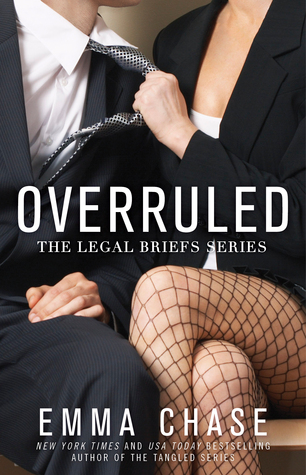 Overruled
Overruled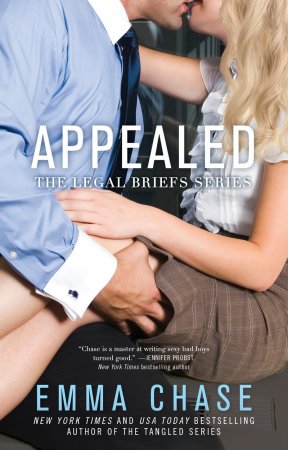 Appealed
Appealed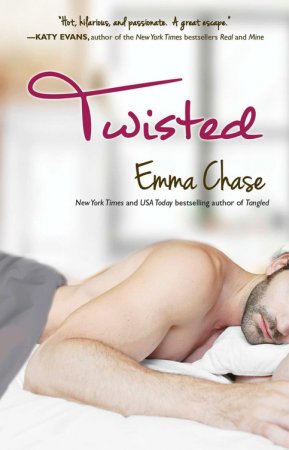 Twisted
Twisted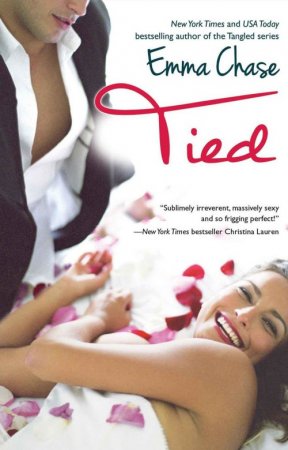 Tied
Tied Royally Screwed
Royally Screwed It's a Wonderful Tangled Christmas Carol
It's a Wonderful Tangled Christmas Carol Tangled
Tangled Tamed
Tamed Sidebarred
Sidebarred Sustained
Sustained Tangled Extra Scenes
Tangled Extra Scenes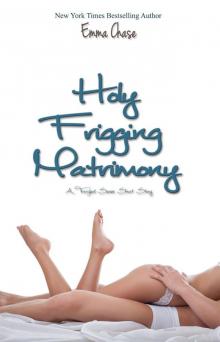 Holy Frigging Matrimony: A Tangled Series Short Story
Holy Frigging Matrimony: A Tangled Series Short Story Getting Schooled
Getting Schooled Royally Matched
Royally Matched Royally Endowed
Royally Endowed Royally Raised
Royally Raised Dirty Charmer
Dirty Charmer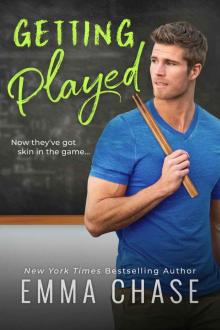 Getting Played (Getting Some Book 2)
Getting Played (Getting Some Book 2) Royally Yours
Royally Yours